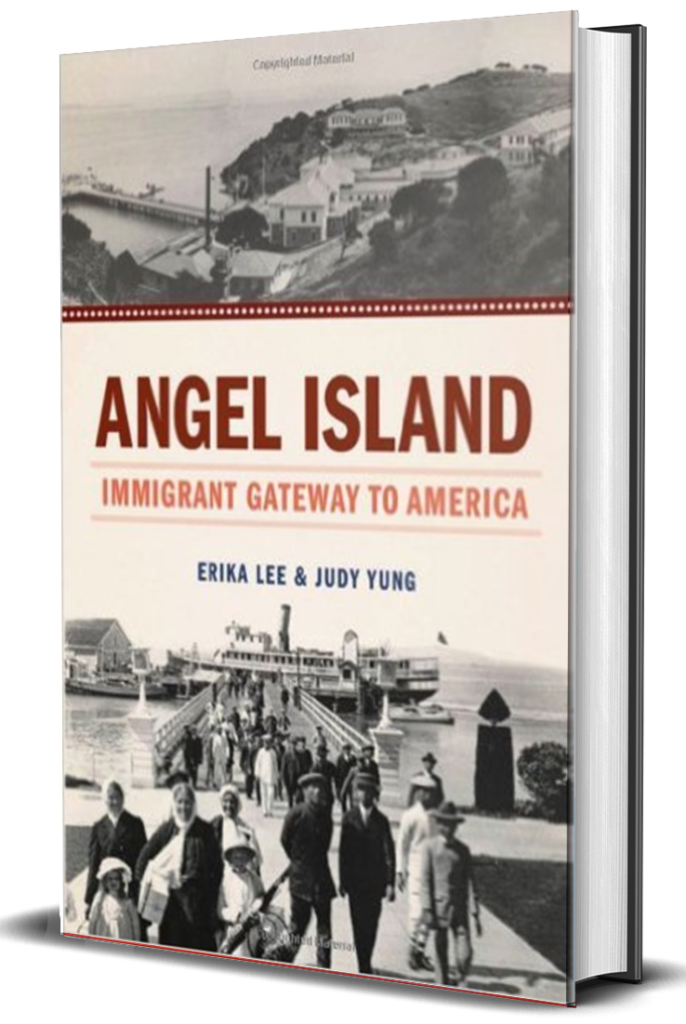
Angel Island
Immigrant Gateway to America
(Co-authored with Judy Yung; New York, Oxford University Press, 2010; 2d edition, 2012)
Buy Now:
AWARDS
2011 Choice Outstanding Academic Title; 2010 Caughey Western History Prize for the best book in Western History, Western History Association; Named a “Best Book of 2010,” San Francisco Chronicle; 2010 Adult Non-Fiction Winner, Asian/Pacific American Awards for Literature, American Library Association; Honorable Mention, Association of Asian American Studies 2010 History Book Award.
ABOUT
From 1910 to 1940, the Angel Island Immigration Station in San Francisco served as the processing and detention center for half a million people from around the world on their way into and out of the United States. Based on extensive archival and community-based research, this landmark book tells the full history of these diverse immigrants (Chinese, Japanese, South Asians, Koreans, Russians, Mexicans, and Filipinos) and their experiences on Angel Island. Connecting Angel Island to global histories of migration, war, colonialism, and revolution, as well as to American histories of race, ethnic, class, and gender relations, Angel Island reframes our understanding of both the Angel Island Immigration Station and America’s complicated relationship to immigration. (Co-authored with Judy Yung and sponsored by the Angel Island Immigration Station Foundation to commemorate the immigration station’s centennial).
PRAISE
“Angel Island skillfully depicts the multilayered interplay of race, nationality, class, gender, American foreign policy priorities, and political sympathies that determined who might enter the United States and who might not.This book is a masterpiece.”
— Peter Kwong, American Historical Review
“Erika Lee and Judy Yung have written the definitive book on Angel Island. The book is meticulously researched and covers not just the Chinese experience but the experiences of all the people who passed through the immigration station. Lee and Yung have used the personal stories of immigrants to make time and place come alive, reminding us that history is something that happens to real people and their families.”
— Lisa See, author of On Gold Mountain: The One-Hundred-Year Odyssey of a Chinese-American Family
“With this comprehensive history, Angel Island may now stand alongside Ellis Island as the other iconic gateway to America. Lee and Yung give a thorough and humane look at the immigrants from surprisingly diverse origins who encountered an America both welcoming and unwelcoming on the Pacific coast.”
— Mae M. Ngai, author of Impossible Subjects: Illegal Aliens and the Making of Modern America
“In this meticulously researched and richly detailed book, Lee and Yung have unlocked Angel Island’s deepest secrets and the link between US immigration policy and restrictive codas of race, gender, class. Their spell-binding narrative lets us journey with Anglos and Latinos as well as Asians and myriad others as they attempt to pass through the eye of the Immigration Station needle–with often vastly different results. Deeply relevant to present-day immigration debates, this book is people’s history at its best.”
— Helen Zia, author of Asian American Dreams: The Emergence of an American People
“With scholarly care and a great feel for the stories of those who passed through Angel Island, Erika Lee and Judy Yung have finally given this important historic site its due. This book teases out the complexities of America’s immigration laws and their enforcement and in doing so greatly adds to our understanding of the immigrant experience.”
— Vincent J. Cannato, author of American Passage: The History of Ellis Island
“Reading Angel Island, a gripping new book on America’s immigrant history, feels like traveling over familiar territory, except that someone turned the road signs in the opposite direction….More than a superb historical text…an essential document in the on-going debate over American freedom.”
— California Literary Review
“Lee and Yung offer a kaleidoscope of immigrant portraits that bring history alive, and, in the process, demolish many myths and stereotypes about Angel Island and American immigration in general.”
— San Francisco Chronicle
“The book is an important contribution to the largely incomplete saga of Pacific region migration.”
— Journal of American History
